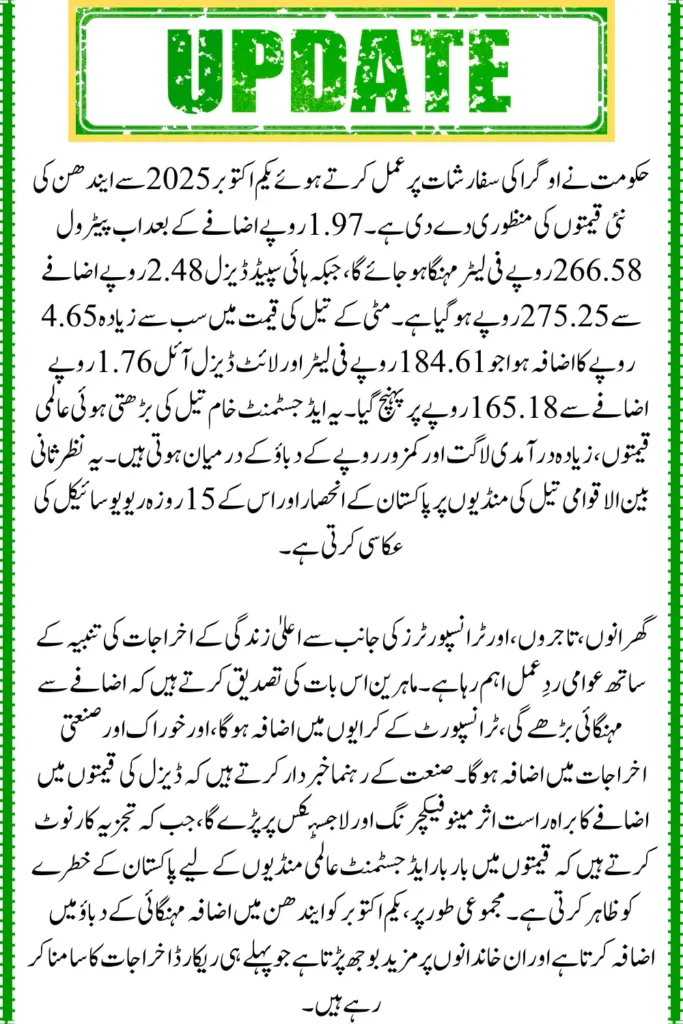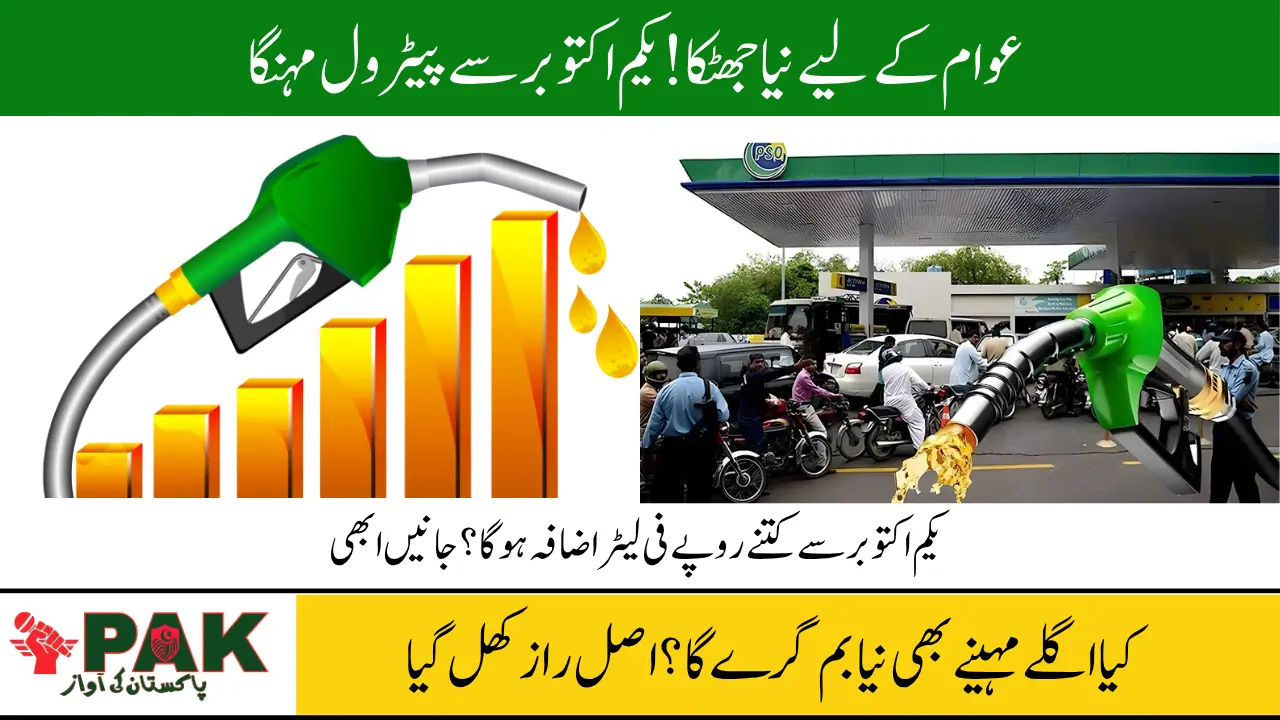Govt Approves Petrol Price Increase Effective October 1
The government has approved a fresh increase in fuel prices effective October 1, 2025. Petrol will now cost Rs266.58 per litre after a hike of Rs1.97. The price of high-speed diesel has gone up by Rs2.48 per litre, reaching Rs275.25. Kerosene oil saw the biggest jump, rising by Rs4.65 to Rs184.61 per litre. Light diesel oil also increased by Rs1.76, setting the new rate at Rs165.18 per litre. These changes come after the Oil and Gas Regulatory Authority (OGRA) sent its summary to the Ministry of Finance for approval.

The hike follows rising global crude prices, higher import costs, and the impact of a weaker rupee. The new rates will put more pressure on household budgets and increase inflation. Transport fares, food prices, and industry expenses are likely to climb further. Citizens are urged to check the official OGRA website for the updated fuel prices. The government reviews petroleum prices every 15 days, and this revision shows Pakistan’s dependence on international oil markets.
You Can Also Read: CM Punjab Free Livestock Program for Abandoned and Bereaved Women
Government’s Official Statement
The government has officially announced a rise in petroleum prices effective October 1, 2025. Petrol, diesel, kerosene, and light diesel will all see price increases after approval from the Prime Minister and the Ministry of Finance. The decision follows OGRA’s recommendation based on global oil trends, higher import costs, and currency pressure.
- Petrol price set at Rs266.58 after a hike of Rs1.97 per litre
- High-speed diesel increased to Rs275.25 with a Rs2.48 rise
- Kerosene oil jumped to Rs184.61 after a Rs4.65 increase
- Light diesel reached Rs165.18 with a Rs1.76 hike
- Prices approved after review of OGRA’s summary
The government approved higher fuel prices from October 1, adding more pressure on consumers.
You Can Also Read: CM Punjab Laptop Scheme Phase 2 Distribution 2025
Key Updates And Fuel Prices
| Fuel Type | Previous Price (Rs/Litre) | New Price (Rs/Litre) | Increase (Rs) | % Change | Notes |
| Petrol Super | 264.61 | 266.58 | +1.97 | +0.7% | Moderate hike |
| High-Speed Diesel | 272.77 | 275.25 | +2.48 | +0.9% | Impacts transport and industry |
| Kerosene Oil | 179.96 | 184.61 | +4.65 | +2.6% | Biggest increase |
| Light Diesel Oil | 163.42 | 165.18 | +1.76 | +1.1% | Used in small vehicles and machinery |
Public & Market Reactions
Public and market reactions to the October 1, 2025, fuel price hike are strong and immediate. Many households express concern over the rising cost of living, as petrol and diesel directly impact transport and food prices. Low- and middle-income families feel the most pressure, with fears of further inflation spreading quickly. Commuters and small businesses worry about higher transport fares, while traders expect supply chain costs to rise.
- Citizens criticise repeated price hikes and fear more inflation
- Transporters plan fare adjustments, adding pressure on commuters
- Traders warn of higher costs for food and daily goods
- Industry leaders say diesel costs will hurt manufacturing and logistics
- Economists highlight Pakistan’s heavy dependence on global oil prices
The fuel price increase has triggered public concern, higher business costs, and fresh inflation fears.
You Can Also Read: PM Laptop Scheme Phase IV 2025, Your Ultimate Guide to Sign-Up Procedure and Entry Conditions
Expert Opinions & Comprehensive Analysis
Expert opinions stress that the October 1, 2025, fuel hike will raise inflation and hit households fast. Energy analysts point to rising crude, higher import costs, and a weak rupee. Economists warn that repeated adjustments will push transport fares and food prices up. Industry leaders say higher diesel prices will raise manufacturing and logistics costs. The overall view: the hike is small per litre but large in cumulative impact.
- Energy analysts: global crude and freight pushed the increase.
- Economists: the hike adds inflationary pressure now.
- Industry leaders: Diesel rise will increase production costs.
- Transport unions: fares will likely go up soon.
- Traders: supply-chain costs will pass to consumers.
- Policy experts: frequent adjustments show reliance on imports.
Experts agree the October 1 fuel hike will widen inflation and raise everyday costs.
You Can Also Read: 35 Electric Buses Debuted in Lahore, Check Routes, Fares, and Timing
Conclusion
The October 1, 2025, fuel price hike highlights Pakistan’s struggle with global oil market pressures. Petrol, diesel, kerosene, and light diesel all saw increases after government approval. The decision adds fresh pressure on families and businesses already facing record inflation and high living costs.
Experts and industry leaders warn that the rise will push up transport fares, food prices, and industrial expenses. Citizens can expect higher daily costs as inflation spreads through the economy. The adjustment shows Pakistan’s heavy reliance on imported fuel and currency stability.
You Can Also Read: NADRA Pensioner Services Go High-tech, Essential Facts for Today
Common Questions
When will the new fuel prices take effect?
The new prices will apply from October 1, 2025, after official approval.
How much has petrol increased?
Petrol price has gone up by Rs1.97 per litre, reaching Rs266.58.
What is the new price of diesel?
High-speed diesel is now Rs275.25 per litre after a Rs2.48 increase.
Which fuel saw the biggest increase?
Kerosene oil saw the steepest rise of Rs4.65 per litre, now priced at Rs184.61.
Why are fuel prices rising in Pakistan?
Prices are increasing due to global crude oil hikes, higher import costs, and a weaker rupee.
Who decides the final fuel prices?
The federal government makes the final decision after reviewing OGRA’s recommendations.
How will this affect daily life?
The hike will raise transport fares, food costs, and industry expenses, putting more pressure on households.
You Can Also Read: EOBI Login Verification Check, Fast Troubleshooting for Workers & Employers









